英语介词用法大全
40个英语介词用法总结
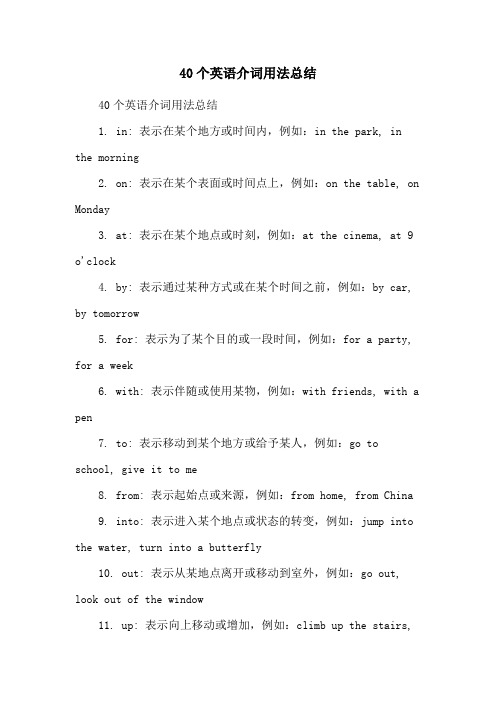
40个英语介词用法总结40个英语介词用法总结1. in: 表示在某个地方或时间内,例如:in the park, in the morning2. on: 表示在某个表面或时间点上,例如:on the table, on Monday3. at: 表示在某个地点或时刻,例如:at the cinema, at 9 o'clock4. by: 表示通过某种方式或在某个时间之前,例如:by car, by tomorrow5. for: 表示为了某个目的或一段时间,例如:for a party, for a week6. with: 表示伴随或使用某物,例如:with friends, with a pen7. to: 表示移动到某个地方或给予某人,例如:go to school, give it to me8. from: 表示起始点或来源,例如:from home, from China9. into: 表示进入某个地点或状态的转变,例如:jump into the water, turn into a butterfly10. out: 表示从某地点离开或移动到室外,例如:go out, look out of the window11. up: 表示向上移动或增加,例如:climb up the stairs,wake up12. down: 表示向下移动或减少,例如:walk down the hill, calm down13. about: 表示关于某事或在某个范围内,例如:talk about the movie, wander about the city14. off: 表示离开或关闭,例如:get off the bus, turnoff the lights15. on: 表示打开或激活,例如:turn on the TV, switch on the computer16. over: 表示越过或在某地上方,例如:jump over the fence, fly over the city17. under: 表示在某物下面或被控制或影响,例如:hide under the bed, live under his rules18. with: 表示具有某种特征或和某人一起做某事,例如:a man with blue eyes, dance with me19. without: 表示没有某物或在缺乏某物的情况下,例如:go without food, live without regret20. by: 表示通过某种方式,例如:learn by doing, go by bus21. through: 表示穿过某物或完成某事,例如:walk through the door, go through the documents22. across: 表示横穿某物或在某个范围内,例如:swimacross the river, all across the world23. between: 表示在两个事物之间或在某个时间段,例如:choose between two options, between 9 and 10 o'clock24. among: 表示在三个或三个以上事物之间或在某群人中,例如:share among friends, discuss among colleagues25. around: 表示在周围或在某个时间点附近,例如:walk around the park, around midnight26. through: 表示通过某事物或在某段时间内,例如:read through the book, work through the night27. against: 表示反对或靠在某物上,例如:fight against injustice, lean against the wall28. for: 表示代表或支持某人或某事,例如:vote for a candidate, fight for freedom29. towards: 表示朝向某个方向或对某人有好感,例如:walk towards the beach, feel towards someone30. within: 表示在某个时间或范围内,例如:arrive within an hour, within the city limits31. beyond: 表示超出某个界限或超过某个程度,例如:beyond expectations, beyond the horizon32. along: 表示沿着某个路线或伴随某人一起,例如:walk along the street, sing along with the song33. above: 表示在某物之上或高于某个程度,例如:flyabove the clouds, above average34. below: 表示在某物之下或低于某个程度,例如:swim below the surface, below freezing35. beside: 表示在某物旁边或和某人一起,例如:sit beside me, beside the lake36. near: 表示在某物附近或接近某个时间,例如:live near the beach, near the end37. past: 表示经过某个地点或在某个时间之后,例如:walk past the store, past midnight38. around: 表示在周围或大约某个数量,例如:look around the room, around 20 people39. after: 表示在某个时间之后或追求某人或某事,例如:after dinner, run after the dog40. before: 表示在某个时间之前或在某个事件之前,例如:before sunrise, before the meeting这些介词是英语中常用的一些基本介词,它们在表达地点、时间、方式等方面起到了重要的作用。
15个英语最常见的介词用法-极简英语

15个英语最常见介词(in on at of for...)的深层次含义英文中15个最常见的介词in/ on/at/of/ for/by /with/ from/to/as/ about/ around/ off/ through/ over一、in (在..里面)1.表示真实的位置: in the car/room2表示抽象的位置: in the book/movie3.表示状态: in danger, in trouble; in anger3.表示时间: in the morning/afternoon/evening. in April; in 20104.表示方式: in the way; in English5.表示穿着: in black shoes/T-shirt二、on (紧紧地接触-连着)1.表示真实的位置: on the table/wall2.表示抽象的位置: on the radio/TV; on the topic/event3.表示具体的时间: on Monday; on Monday morning; on May 4th4.表示状态: on duty; on holiday; the game is on三、at(在.点上)1.表示真实的位置: at home/the company/the store2.表示抽象的位置: be good/bad at English3.表示具体的时间: at 3 pm;at night; at the age of 204.表示状态: at work-在工作; at table-在吃饭四、Of(的-从属关系)1.表示"无生命主体的":the window of the room; top of the mountain...2.某某市: the city of Bejing3.表示数量: a piece/bx/bottle/pair.. of五、for(为了/因为/对时间/对.而言/支持赞成)1.表示为了":go for a walk; I come here fr my schoolbag2.表示"因为": Thank you for helping me; for the reason3.表示"时间"和: for 3 days; for a week; for a year4.表示对..而言": It is important for me5.表示”支持,赞成": Are you for this plan or against it?六、by(通过.交通工具/在.附近/街至.时间/被)1.表示"通过.交通工具":by train/subway/plane/air/ship/seaI learn English by watchingEnglish movies.2.表示在附近":a table by the window; the house is by the lake3.表示"截至到..时间":by the end of next week; by 20194.表示"被(被动语态)":English is spoken by people all over the world.七、with (伴随)1.表示"和.起":go with:play with;make friends with;cooperate with2.表示"携有,带有":a county with a long history; a house with a big garden3.表示..工具:cut the apple with the knife4.表示"伴随":with the development of the society;with the help of my teacher;I don't have any cash with me.八、from (远离)1.表示"来自":I am/come from China;a gift from my best friend;a man from America2.由"远离"来记短语:stop/prevent/keep sb from doing sth阻止某人做某事be away from...远离...be different from与.不同be absent from缺席....how far is it from here?它离这远The paper is made from wood.这纸是由木头制成的3.表示..到": from...to...由"指向"来理解下列用法:The road leads to Paris.这条路通往巴黎Smoking is harmful to your health.吸烟有害健康the answer to the question.这个问题的答案九、to (指向..)contribute to对..做贡献on one's way to... 在某人去某地的路上belong to属于..be used to doing sth习惯于做某事lead to...导致十、as作为He works as a tour guide.他作为导游工作。
介词用法总结

介词用法总结介词是英语语法中一个重要的词类,用于表示名词、代词、动词和形容词等与其他词或短语之间的关系。
在不同的句子和语境中,介词具有不同的用法。
本文将对介词的用法进行总结,并提供相关的例句。
一、表示位置关系的介词1. in:在…之中,在(具体范围)。
例句:He is waiting in the car.(他正在车里等待。
)2. on:在…之上,在(水平面)。
例句:The book is on the table.(书在桌子上。
)3. at:在…地方,在(具体点)。
例句:She is studying at the library.(她在图书馆学习。
)4. by:在…旁边,靠近(某物)。
例句:He is standing by the door.(他站在门旁边。
)5. under:在…下面,在(某物)的底部。
例句:The cat is hiding under the bed.(猫在床下躲藏。
)6. between:在…之间(两者之间)。
例句:The restaurant is located between the bank and the supermarket.(这家餐厅位于银行和超市之间。
)二、表示时间关系的介词1. at:在(具体时间点)。
例句:She will meet her friend at 8 o'clock.(她将在8点钟见她的朋友。
)2. on:在(具体日期或星期)。
例句:I have a meeting on Monday.(星期一我有个会议。
)3. in:在(一段时间内)。
例句:He will travel to Europe in summer.(他将在夏天去欧洲旅行。
)4. during:在…期间,表示全程。
例句:I read a book during the flight.(我在飞行途中读了一本书。
)5. for:持续时间,表示时间段。
例句:They have been married for ten years.(他们已经结婚十年了。
40个介词用法总结

40个介词用法总结介词是英语中非常重要的一类词性,它在句子中起着连接词与词、短语与短语的作用。
介词的正确使用对于句子的表达和理解至关重要。
下面将介绍40个常见介词的用法总结,希望能够帮助大家更好地掌握介词的用法。
1. about。
介词about表示“关于”,用于询问或表达主题或内容。
例如,What are you talking about?(你在谈论什么?)。
2. above。
介词above表示“在……之上”,用于表示位置关系。
例如,The sun is above the clouds.(太阳在云层之上。
)。
3. across。
介词across表示“横过,穿过”,用于表示横跨某个区域或穿过某个物体。
例如,We walked across the bridge.(我们走过了桥。
)。
4. after。
介词after表示“在……之后”,用于表示时间先后关系。
例如,We'll go for a walk after dinner.(晚饭后我们会去散步。
)。
5. against。
介词against表示“靠着,依靠”,用于表示两个物体之间的接触或支撑关系。
例如,He leaned against the wall.(他靠在墙上。
)。
6. along。
介词along表示“沿着”,用于表示沿着某个方向或路线。
例如,We walked along the river.(我们沿着河边走。
)。
7. amid。
介词amid表示“在……之中”,用于表示某个场所或环境中。
例如,The children played happily amid the flowers.(孩子们在花丛中快乐地玩耍。
)。
8. among。
介词among表示“在……之中”,用于表示三个或三个以上的人或物之间的关系。
例如,She is among the top students in her class.(她是班里的尖子学生之一。
)。
9. around。
英语介词用法大全

英语介词用法大全★早、午、晚要用in,at黎明、午夜、点与分。
年、月、年月、季节、周,阳光、灯、影、衣、冒in。
将来时态in...以后,小处at大处in。
有形with无形by,语言、单位、材料in。
特征、方面与方式,心情成语惯用in。
介词at和to表方向,攻击、位置、恶、善分。
★日子、日期、年月日,星期加上早、午、晚,收音、农场、值日on,关于、基础、靠、著论。
着、罢、出售、偷、公、假,故意、支付、相反,准。
特定时日和“一……就”,on后常接动名词。
年、月、日加早、午、晚,of之前on代in。
步行、驴、马、玩笑on,cab,carriage则用in。
★at山脚、门口、在当前,速、温、日落、价、核心。
工具、和、同随with,具有、独立、就、原因。
就……来说宾译主,对、有、方状、表细分。
海、陆、空、车、偶、被by,单数、人类know to man。
★this、that、tomorrow,yesterday,next、last、one。
接年、月、季、星期、周,介词省略已习惯。
over、under正上下,above、below则不然,若与数量词连用,混合使用亦无关。
…beyond超出、无、不能,against靠着,对与反。
besides,except分内外,among之内along沿。
同类比较except,加for异类记心间。
★原状because of,、owing to、due to表语形容词under后接修、建中,of、from物、化分。
★before、after表一点, ago、later表一段。
before能接完成时,ago过去极有限。
since以来during间,since时态多变换。
与之相比beside,除了last but one。
复不定for、找、价、原,对、给、段、去、为、作、赞。
快到、对、向towards,工、学、军、城、北、上、南。
but for否定用虚拟,复合介词待后言。
ing型由于鉴,除了除外与包合。
英语介词的用法总结(完整版)
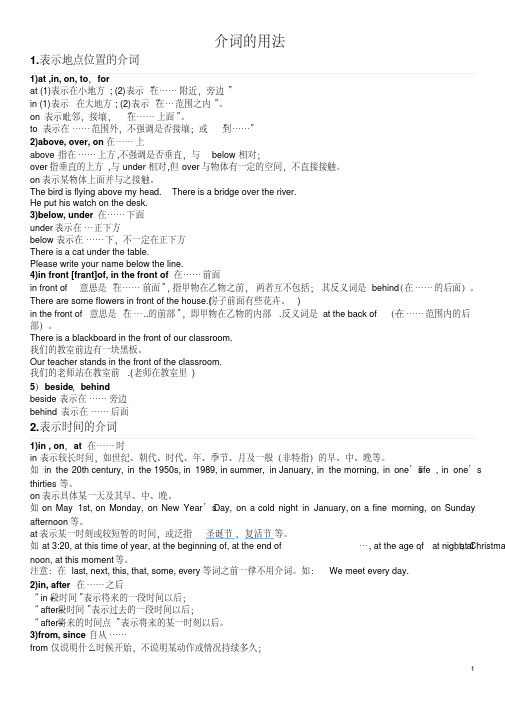
介词的用法1.表示地点位置的介词1)at ,in, on, to,forat (1)表示在小地方; (2)表示“在……附近,旁边”in (1)表示在大地方; (2)表示“在…范围之内”。
on 表示毗邻,接壤,“在……上面”。
to 表示在……范围外,不强调是否接壤;或“到……”2)above, over, on 在……上above 指在……上方,不强调是否垂直,与below相对;over指垂直的上方,与under相对,但over与物体有一定的空间,不直接接触。
on表示某物体上面并与之接触。
The bird is flying above my head. There is a bridge over the river.He put his watch on the desk.3)below, under 在……下面under表示在…正下方below表示在……下,不一定在正下方There is a cat under the table.Please write your name below the line.4)in front [frant]of, in the front of在……前面意思是“在……前面”,指甲物在乙物之前,两者互不包括;其反义词是behind(在……的后面)。
in front of…There are some flowers in front of the house.(房子前面有些花卉。
)in the front of 意思是“在…..的前部”,即甲物在乙物的内部.反义词是at the back of…(在……范围内的后部)。
There is a blackboard in the front of our classroom.我们的教室前边有一块黑板。
Our teacher stands in the front of the classroom.我们的老师站在教室前.(老师在教室里)5)beside,behindbeside 表示在……旁边behind 表示在……后面2.表示时间的介词1)in , on,at 在……时in表示较长时间,如世纪、朝代、时代、年、季节、月及一般(非特指)的早、中、晚等。
英语中常见介词用法总结
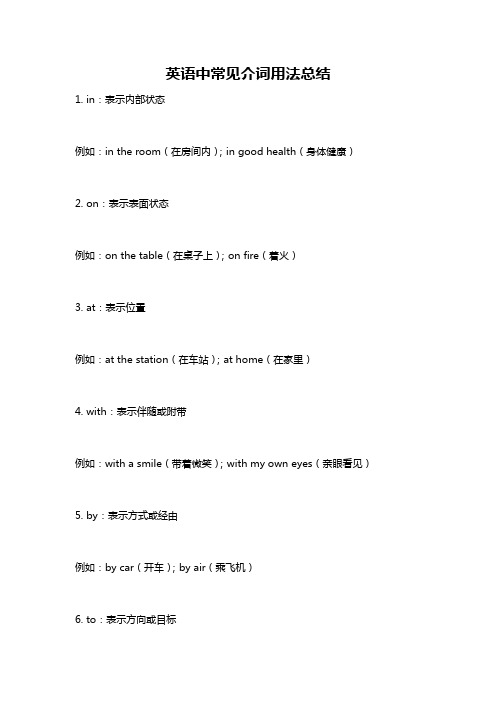
英语中常见介词用法总结
1. in:表示内部状态
例如:in the room(在房间内);in good health(身体健康)2. on:表示表面状态
例如:on the table(在桌子上);on fire(着火)
3. at:表示位置
例如:at the station(在车站);at home(在家里)
4. with:表示伴随或附带
例如:with a smile(带着微笑);with my own eyes(亲眼看见)5. by:表示方式或经由
例如:by car(开车);by air(乘飞机)
6. to:表示方向或目标
例如:to the park(去公园);to the moon(到月球)
7. from:表示出发地或来源
例如:from Beijing(来自北京);from the magazine(从杂志中)
8. for:表示目的或用途
例如:for a birthday party(为了生日派对);for writing(用于写作)
9. of:表示属于或关系
例如:the book of Harry Potter(哈利·波特的书);the sister of Mary(玛丽的姐姐)
10. with:表示具有或伴随
例如:a man with a gun(拿着枪的人);a girl with long hair(长发女孩)。
(完整版)英语中介词的用法
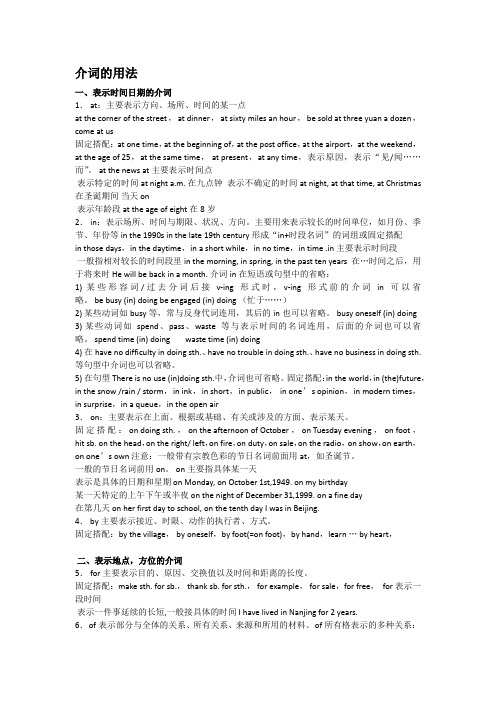
介词的用法一、表示时间日期的介词1.at:主要表示方向、场所、时间的某一点at the corner of the street,at dinner,at sixty miles an hour,be sold at three yuan a dozen,come at us固定搭配:at one time,at the beginning of,at the post office,at the airport,at the weekend,at the age of25,at the same time,at present,at any time,表示原因,表示“见/闻……而”。
at the news at主要表示时间点表示特定的时间at night a.m.在九点钟表示不确定的时间at night,at that time,at Christmas 在圣诞期间当天on表示年龄段at the age of eight在8岁2.in:表示场所、时间与期限、状况、方向。
主要用来表示较长的时间单位,如月份、季节、年份等in the1990s in the late19th century形成“in+时段名词”的词组或固定搭配in those days,in the daytime,in a short while,in no time,in time.in主要表示时间段一般指相对较长的时间段里in the morning,in spring,in the past ten years在…时间之后,用于将来时He will be back in a month.介词in在短语或句型中的省略:1)某些形容词/过去分词后接v-ing形式时,v-ing形式前的介词in可以省略。
be busy(in)doing be engaged(in)doing(忙于……)2)某些动词如busy等,常与反身代词连用,其后的in也可以省略。
英语介词的用法归纳
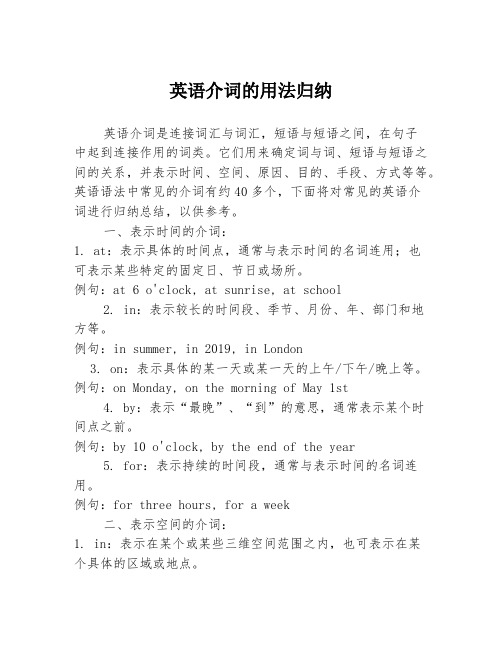
英语介词的用法归纳英语介词是连接词汇与词汇,短语与短语之间,在句子中起到连接作用的词类。
它们用来确定词与词、短语与短语之间的关系,并表示时间、空间、原因、目的、手段、方式等等。
英语语法中常见的介词有约40多个,下面将对常见的英语介词进行归纳总结,以供参考。
一、表示时间的介词:1. at:表示具体的时间点,通常与表示时间的名词连用;也可表示某些特定的固定日、节日或场所。
例句:at 6 o'clock, at sunrise, at school2. in:表示较长的时间段、季节、月份、年、部门和地方等。
例句:in summer, in 2019, in London3. on:表示具体的某一天或某一天的上午/下午/晚上等。
例句:on Monday, on the morning of May 1st4. by:表示“最晚”、“到”的意思,通常表示某个时间点之前。
例句:by 10 o'clock, by the end of the year5. for:表示持续的时间段,通常与表示时间的名词连用。
例句:for three hours, for a week二、表示空间的介词:1. in:表示在某个或某些三维空间范围之内,也可表示在某个具体的区域或地点。
例句:in the room, in the park2. on:表示在某个平面面上,通常用来表示地点。
例句:on the table, on the wall3. at:表示在某个具体的地点或位置。
例句:at the door, at the bus stop4. by:表示“靠近”、“经过”等含义。
例句:by the river, by the window5. between:表示在两个或两个以上的物体或位置之间。
例句:between two mountains, between the buildings6. among:表示在三个或三个以上的物体或位置之间。
40个英语介词用法总结
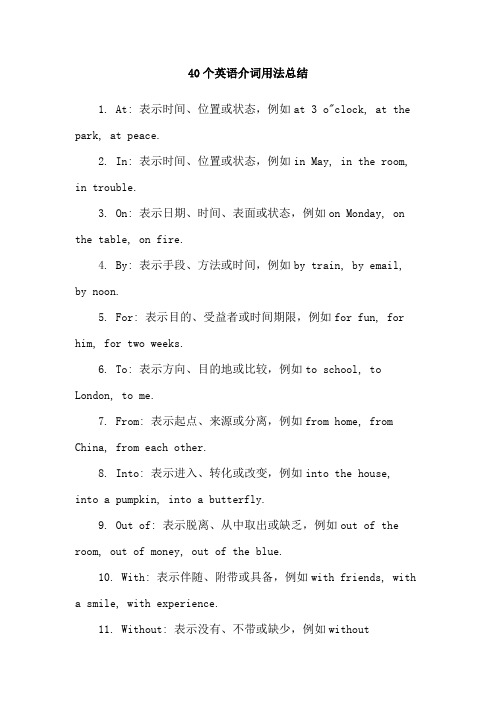
40个英语介词用法总结1. At: 表示时间、位置或状态,例如at 3 o"clock, at the park, at peace.2. In: 表示时间、位置或状态,例如in May, in the room, in trouble.3. On: 表示日期、时间、表面或状态,例如on Monday, on the table, on fire.4. By: 表示手段、方法或时间,例如by train, by email, by noon.5. For: 表示目的、受益者或时间期限,例如for fun, for him, for two weeks.6. To: 表示方向、目的地或比较,例如to school, to London, to me.7. From: 表示起点、来源或分离,例如from home, from China, from each other.8. Into: 表示进入、转化或改变,例如into the house,into a pumpkin, into a butterfly.9. Out of: 表示脱离、从中取出或缺乏,例如out of the room, out of money, out of the blue.10. With: 表示伴随、附带或具备,例如with friends, witha smile, with experience.11. Without: 表示没有、不带或缺少,例如withoutpermission, without shoes, without doubt.12. Over: 表示覆盖、超过或结束,例如over the roof, over the limit, over and done with.13. Under: 表示在下面、被支配或不足,例如under the table, under his control, under budget.14. About: 表示关于、大约或忙于,例如about the movie, about 10 dollars, about to leave.15. Above: 表示在上面、高于或超过,例如above the clouds, above average, above suspicion.16. Below: 表示在下面、低于或不足,例如below the surface, below freezing, below par.17. Across: 表示横穿、相交或涉及,例如across the street, across the board, across his mind.18. Beyond: 表示超出、远离或除了,例如beyond repair, beyond belief, beyond her control.19. Around: 表示周围、附近或环绕,例如around the corner, around the clock, around the world.20. Before: 表示以前、在前面或比较,例如before noon, before the house, before his time.21. Behind: 表示在后面、落后或背后,例如behind the house, behind schedule, behind the scenes.22. Beside: 表示在旁边、与...相比或附加,例如besidethe river, beside myself, beside the point.23. Inside: 表示内部、在里面或被包含,例如inside the box, inside the building, inside information.24. Outside: 表示外部、在外面或超出,例如outside the house, outside the box, outside the norm.25. Through: 表示穿过、经过或完成,例如through the door, through the park, through with it.26. Throughout: 表示遍布、贯穿或在整个期间,例如throughout the city, throughout history, throughout the day.27. Towards: 表示朝向、对于或接近,例如towards the sun, towards him, towards the end.28. Against: 表示反对、抵抗或紧挨着,例如against the law, against the current, against the wall.29. Among: 表示在...之中、相互之间或被分配到,例如among friends, among the stars, among the winners.30. Between: 表示在两者之间、在中间或相互之间,例如between two trees, between classes, between you and me.31. Within: 表示在内部、在范围之内或在规定时间内,例如within the house, within the budget, within a week.32. Without: 表示在外面、没有或不用,例如without the room, without a doubt, without further ado.33. Beneath: 表示在下面、低于或不足,例如beneath the surface, beneath his dignity, beneath contempt.34. Beside: 表示在旁边、与...相比或附加,例如beside the river, beside myself, beside the point.35. Into: 表示进入、转化或改变,例如into the house, into a pumpkin, into a butterfly.36. Upon: 表示在...之上、一旦发生或基于,例如upon the hill, upon arrival, upon further consideration.37. With: 表示伴随、附带或具备,例如with friends, witha smile, with experience.38. Within: 表示在内部、在范围之内或在规定时间内,例如within the house, within the budget, within a week.39. Without: 表示没有、不带或缺少,例如without permission, without shoes, without doubt.40. Beneath: 表示在下面、低于或不足,例如beneath the surface, beneath his dignity, beneath contempt.。
英语介词知识点用法总结

英语介词知识点用法总结英语介词知识点用法总结1表示方位的介词:in,to, on 1. in表示在某地范围之内。
如:XXX China.上海在中国的东部。
2. to表示在某地范围之外。
如:Japan is/lies to the east of China.日本位于中国的东面。
3. on表示与某地相邻或接壤。
如:XXX.蒙古国位于中国北边。
2表示计量的介词:at, for, by1. at表示“以……速度”“以……价格”。
如:It flies at about 900 XXX.它以每小时900公里的速度飞行。
I sold my car at a high price.我以高价出售了我的汽车。
2. for透露表现“用……交换,以……为价格”。
如:He sold his car for 500 dollars.他以五百元把车卖了。
注意:at表示单价(price) ,for表示总钱数。
3. by表示“以……计”,后跟度量单位。
如:They paid him by the month.他们按月给他计酬。
Here XXX.在这里鸡蛋是按重量卖的。
3透露表现资料的介词:of, from, in1. of制品仍可看出质料。
如:This box is made of paper.这个盒子是纸做的。
2. from制品已看不出质料。
如:Wine is made from grapes.葡萄酒是葡萄酿成的。
3. in透露表现用某种资料或语言。
如:Please fill in the form in pencil first.请先用铅笔填写这个表格。
XXX.他们用英语交谈。
留意:in指用资料,不消冠词;而with指用工具,要用冠词。
请比力: XXX与draw with a pencil.4表示工具或手段的介词:by, with, on1. by用某种体式格局,多用于交通。
如:XXX乘公共汽车by e-mail.通过电子邮件留意:透露表现搭乘交通工具时,用by时不消冠词,用in时要用冠词。
英语介词用法整理总结(超全面)
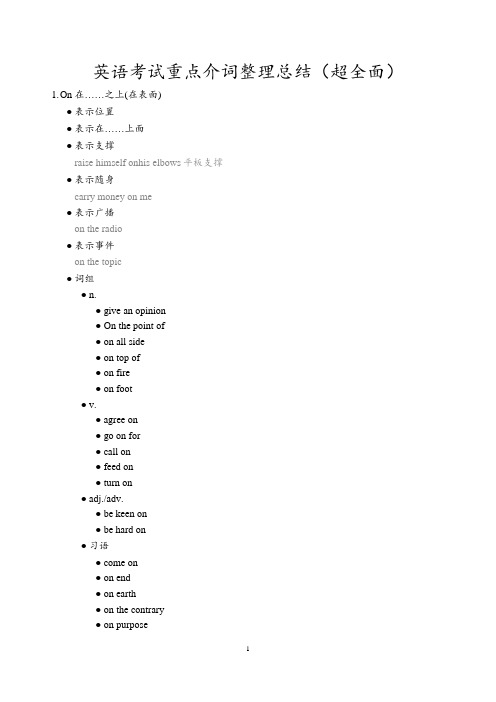
英语考试重点介词整理总结(超全面)1.O n 在……之上(在表面)●表示位置●表示在……上面●表示支撑raise himself onhis elbows平板支撑●表示随身carry money on me●表示广播on the radio●表示事件on the topic●词组●n.●give an opinion●On the point of●on all side●on top of●on fire●on foot●v.●agree on●go on for●call on●feed on●turn on●adj./adv.●be keen on●be hard on●习语●come on●on end●on earth●on the contrary●on purpose2.I n 在……里面●含义●表示位置●表示在作品中is the book●表示时间段●在状态in the trouble●表示方式in English , in print●表示穿着in a suit●词组●n.●arm in arm●a case in point一个典型的例子●in a hurry●in detail●in turn●in spite of●v.●abound in●get in touch with●keep in touch●adj/adv.●be abound in●be absorbed in专心致力于……3.A t 在(一个点)●含义●表示地点/场所●在旁边at the table●表示距离at certain distance, at an angle●表示时刻at 3am.●表示年龄at the age of 17●词组●at bottom●glance at●run out of 达到(某数字)●feel amused at●not at all4.o f 属于……的●含义●表示特征the aim of the course●表示从属特点Bank of China●表示数量a piece of paper●表示动作building of house●词组●n.●take advantage of●back of●take care of●v.●accuse sb. ofsth.●consist of●die of●adj./adv.●ahead of●be afraid of●be full of5.f or 为了●6.b y 依靠●含义●表示人He was brought up by his father.●表示手段by car●表示巧合I met by chance.碰运气。
英语介词用法最全总结
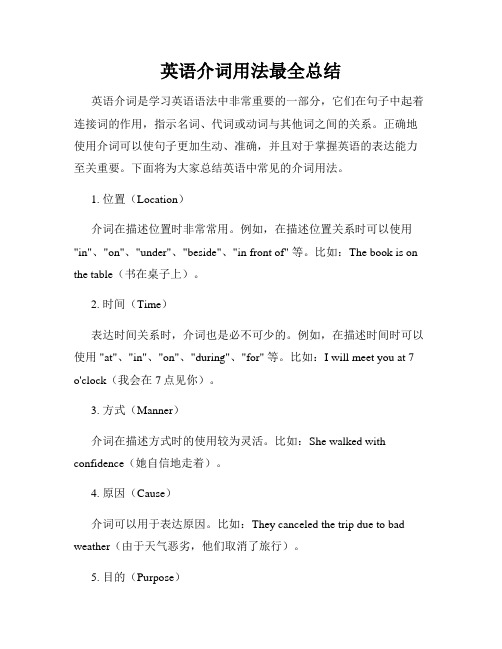
英语介词用法最全总结英语介词是学习英语语法中非常重要的一部分,它们在句子中起着连接词的作用,指示名词、代词或动词与其他词之间的关系。
正确地使用介词可以使句子更加生动、准确,并且对于掌握英语的表达能力至关重要。
下面将为大家总结英语中常见的介词用法。
1. 位置(Location)介词在描述位置时非常常用。
例如,在描述位置关系时可以使用"in"、"on"、"under"、"beside"、"in front of" 等。
比如:The book is on the table(书在桌子上)。
2. 时间(Time)表达时间关系时,介词也是必不可少的。
例如,在描述时间时可以使用 "at"、"in"、"on"、"during"、"for" 等。
比如:I will meet you at 7 o'clock(我会在7点见你)。
3. 方式(Manner)介词在描述方式时的使用较为灵活。
比如:She walked with confidence(她自信地走着)。
4. 原因(Cause)介词可以用于表达原因。
比如:They canceled the trip due to bad weather(由于天气恶劣,他们取消了旅行)。
5. 目的(Purpose)介词也能表达目的。
比如:He went to the store to buy some groceries (他去商店买些食品)。
6. 所属关系(Possession)介词可以用于表达所属关系。
比如:This book belongs to me(这本书是我的)。
7. 比较(Comparison)在进行比较时,介词也可以派上用场。
比如:I am taller than my sister(我比我妹妹高)。
(详细版)介词的用法总结
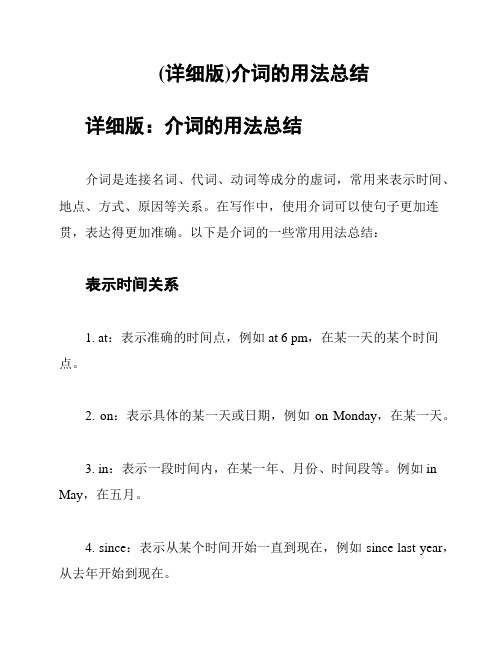
(详细版)介词的用法总结详细版:介词的用法总结介词是连接名词、代词、动词等成分的虚词,常用来表示时间、地点、方式、原因等关系。
在写作中,使用介词可以使句子更加连贯,表达得更加准确。
以下是介词的一些常用用法总结:表示时间关系1. at:表示准确的时间点,例如 at 6 pm,在某一天的某个时间点。
2. on:表示具体的某一天或日期,例如on Monday,在某一天。
3. in:表示一段时间内,在某一年、月份、时间段等。
例如 in May,在五月。
4. since:表示从某个时间开始一直到现在,例如 since last year,从去年开始到现在。
5. for:表示持续的时间,在某段时间内。
例如 for two hours,持续两个小时。
表示地点关系1. at:表示在某个位置。
例如 at home,在家。
2. on:表示在一个平面面上。
例如 on the table,在桌子上。
3. in:表示在一个封闭的空间内。
例如in the room,在房间里。
4. to:表示到某个地方。
例如 go to school,去学校。
表示方式、原因、目的等关系1. by:表示通过某种方式。
例如 by plane,乘飞机。
2. with:表示用某种工具或伴随某人物。
例如 write with pen,用笔写。
3. for:表示为了某种目的。
例如 for health,为了健康。
4. because of:表示因为某种原因。
例如 because of the rain,因为下雨。
以上只是介词用法的一部分,需要灵活运用,不要生搬硬套,以免出现错误。
希望以上总结对您有所帮助。
(完整版)英语中介词的用法
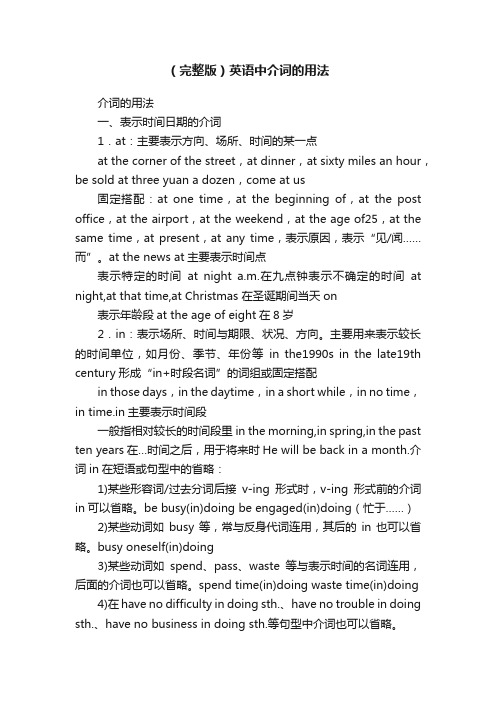
(完整版)英语中介词的用法介词的用法一、表示时间日期的介词1.at:主要表示方向、场所、时间的某一点at the corner of the street,at dinner,at sixty miles an hour,be sold at three yuan a dozen,come at us固定搭配:at one time,at the beginning of,at the post office,at the airport,at the weekend,at the age of25,at the same time,at present,at any time,表示原因,表示“见/闻……而”。
at the news at主要表示时间点表示特定的时间at night a.m.在九点钟表示不确定的时间at night,at that time,at Christmas 在圣诞期间当天on表示年龄段at the age of eight在8岁2.in:表示场所、时间与期限、状况、方向。
主要用来表示较长的时间单位,如月份、季节、年份等in the1990s in the late19th century形成“in+时段名词”的词组或固定搭配in those days,in the daytime,in a short while,in no time,in time.in主要表示时间段一般指相对较长的时间段里in the morning,in spring,in the past ten years在…时间之后,用于将来时He will be back in a month.介词in在短语或句型中的省略:1)某些形容词/过去分词后接v-ing形式时,v-ing形式前的介词in可以省略。
be busy(in)doing be engaged(in)doing(忙于……)2)某些动词如busy等,常与反身代词连用,其后的in也可以省略。
英语介词用法大全

英语介词用法大全一、介词preposition缩写prep,又叫前置词,表示其后的名词或代词(或是相当于名词的其他短语或从句)与其他句子成分的关系。
介词是一种虚词,不能单独在句中作成分。
二. 常用介词用法区分:1、in, on, to表示地理位置:in表示在某范围内,on指与什么毗邻,to指在某环境范围之外;2、on, in表示“在…上”时:on只表示在某物的表面上,in表示占去某物一部分;3、through, across都表示“穿过”时:through表示从内部通过,与in有关,across表示在表面上通过,与on有关;4、since, from表示表示时间时:since 指从过去到现在的一段时间,和完成时连用,from指从时间的某一点开始;5、in, on, at表示时间时:at表示片刻的时间,in表示一段的时间,on总是与日子有关;6、in, after表示时间时:in指在一段时间之后,after表示某一具体时间点之后或用在过去时的一段时间中;7、about, on表示“关于”时:about指涉及到,on指专门论述;8、besides与except表示“除了”:besides指“除了…还有再加上”,except指“除了,减去什么”,不放在句首;9、between与among表示“在两者之间”:between表示在两者之间,among用于三者或三者以上的中间;10、in, with表示“用”时:with表示具体的工具,in表示材料,方式,方法,度量,单位,语言,声音;11、in与into表示在里面:in通常表示位置(静态),into表示动向,不表示目的地或位置。
12、as与like:as意为“作为,以…地位或身份”,like为“象…一样”,指情形相似;三、介词用法口诀1、年月周前要用in,遇到几号用on,上午下午又是in.要说某日上下午,on换成in,午夜黄昏用at,黎明用它也不借。
at也在时分前,说“差”要用to,说“过”用part。
英语中所有介词的用法
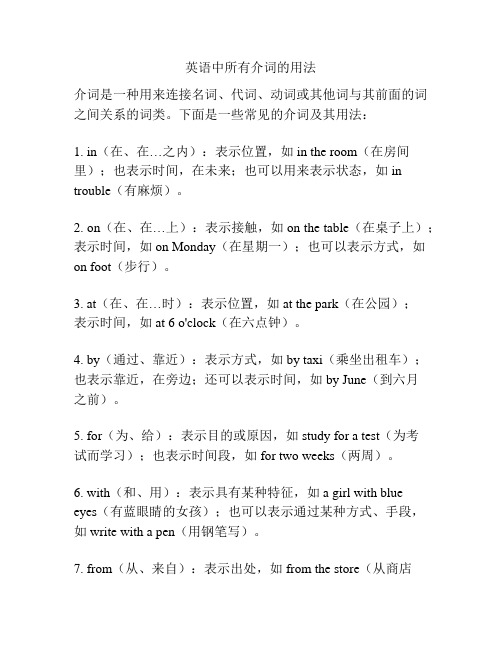
英语中所有介词的用法
介词是一种用来连接名词、代词、动词或其他词与其前面的词之间关系的词类。
下面是一些常见的介词及其用法:
1. in(在、在…之内):表示位置,如in the room(在房间里);也表示时间,在未来;也可以用来表示状态,如in trouble(有麻烦)。
2. on(在、在…上):表示接触,如on the table(在桌子上);表示时间,如on Monday(在星期一);也可以表示方式,如on foot(步行)。
3. at(在、在…时):表示位置,如at the park(在公园);
表示时间,如at 6 o'clock(在六点钟)。
4. by(通过、靠近):表示方式,如by taxi(乘坐出租车);也表示靠近,在旁边;还可以表示时间,如by June(到六月
之前)。
5. for(为、给):表示目的或原因,如study for a test(为考
试而学习);也表示时间段,如for two weeks(两周)。
6. with(和、用):表示具有某种特征,如a girl with blue
eyes(有蓝眼睛的女孩);也可以表示通过某种方式、手段,
如write with a pen(用钢笔写)。
7. from(从、来自):表示出处,如from the store(从商店
里);表示起点,如from London(从伦敦)。
8. to(到、向):表示目的地,如go to school(去学校);表示方向,如face to the north(面朝北方)。
这只是一部分介词的使用方法,介词的用法还有很多,需要根据具体语境来理解和运用。
- 1、下载文档前请自行甄别文档内容的完整性,平台不提供额外的编辑、内容补充、找答案等附加服务。
- 2、"仅部分预览"的文档,不可在线预览部分如存在完整性等问题,可反馈申请退款(可完整预览的文档不适用该条件!)。
- 3、如文档侵犯您的权益,请联系客服反馈,我们会尽快为您处理(人工客服工作时间:9:00-18:30)。
英语介词用法大全早、午、晚要用 in例: in the morning/ afternoon/ evening 在早上/下午/晚上 in the day 在白天年、月、年月、季节、周即在“某年”,在“某月”,在“某年某月”,在四季,在第几周等都要用 in。
例:in 1986 在 1986 年 / in April 在四月 / in December, 1986 1986年12月in spring 在春季 in summer 在夏季 in autumn 在秋季 in winter 在冬季in the fist week of this semester 这学期的第一周 / in the third week 在第三周阳光、灯、影、衣、冒 in,即在阳光下,在灯下,在树阴下,穿衣、着装、冒雨等都要用 in。
例:Don't read in dim light. 切勿在暗淡的灯光下看书。
They are sitting in the shade of a tree. 他们坐在树阴下乘凉。
He went in the rain to meet me at the station. 他冒雨到车站去接我。
The poor dressed in rags in old society. 旧社会穷人们衣衫褴褛。
the woman in white 穿着白色衣服的妇女 in uniform 穿着制服将来时态 in …以后例: They will come back in 10 days. 他们将10天以后回来。
Come and see me in two days' time. 两天后来看我。
(从现在开始)at 黎明、午、夜、点与分例: at dawn/ daybreak 在黎明时候at noon/ night 在中午/夜间以上短语都不用冠词at six o'clock 在6点钟 / five minutes after two 2点过5分小处 at 大处 in例: I live in a great city , my sister lives at a small town while my parents live at a village. 我住在大城市,我姐姐住在一个小城镇,而我的父母则住在农村。
有形 with 无形 by,语言、单位、材料 in例:The workers are paving a road with stone. 工人们正用石子铺路。
“Taking Tiger Mountain by Strategy”is a good opera. <<智取威虎山>>是—出好戏。
I really can't express my idea in English freely in-deed.我确实不能用英语流利地表达我的思想。
(表示某种语言用 in)The kilometer is the biggest unit of length in the metric system.公里是米制中最长的长度单位。
(表示度、量、衡单位的用 in )This board was cast in bronze not in gold. 这个牌匾是铜铸的,不是金铸的。
特征、方面与方式、心情、成语惯用 in例: They found the patient in a coma. 他们发现病人处于昏迷状态。
The house was in ruins. 这房屋成了废墟。
The poor girl was in tears. 这个贫苦女孩泪流满面。
Her clothes were in rags. 她的衣服穿破了。
She spoke in grief rather than in anger. 与其说她讲得很气愤,不如说她讲得很伤心。
还有一些短语也用 in,如:in jest 诙谐地,in joke 开玩笑地,in spite 恶意地, in fairness 公正地,in revenge 报复, in mercy 宽大,in sorrow 伤心地等。
in all 总计,in advance 事前,in the meantime 与此同时,in place 适当地in hopes of(或 in the hope of) 怀着……希望,in connection with 和……有关in contact with 和……联系,in addition to 除……以外,in case of 倘若,万一in conflict with 和……冲突,in force 有效的,大批,in depth 彻底地in regard to 关于,in the neighborhood of 大约、邻近,in retrospect 回顾,一想起in behalf of 代表……利益,in the least 一点,丝毫,in alarm 惊慌、担心in the opinion of 据……见解,in the long run 从长远说来,in one's opinion 在…看来in word 口头上,in a word 总之,in vain 无益地, 白白地,in case 如果,万一,以防in detail 详细地,in haste 急急忙忙地,in conclusion 总之,in spite of 尽管in other words …换句话说,in return 作为回报,in the name of 以……名义be confident in 对……有信心,be interested in 对……感兴趣,in doubt 怀疑in love 恋爱中,in debt 负债,in fun (jest、joke) 玩笑地,in hesitation 犹豫不决in wonder 在惊奇中,in public (secret) 公开他(秘密地),in a good humour 心情介词 at 和 to 都可以表示方向; 用 at 表示方向时,侧重于攻击的目标,往往表示恶意;用to 表示方向时,突出运动的位置或动作的对象,侧重表示善意。
试比较下列各句:came at me. 她向我扑过来。
came to me. 她向我走过来。
shouted at the old man. 他大声喝斥那老人。
B. He shouted to the old man. 他大声向那老人说。
heard her muttering at Xiao Li. 我听见她在抱怨小李。
heard her muttering to Xiao Li. 我听见她在同小李低声说话。
日子、日期、年月日,星期加上早午晚; 以下皆用 on。
例: on October the first 1949 1949年10月1日on May the first 5月1日,on the first 1号on a summer evening 在夏天的一个夜晚on New Year's Day 在元旦,on my birthday 在我的生日但 in the Christmas holidays 在圣诞节假期; in the eighteenth century 在十八世纪; in ancient times 在古代; in earlier times 在早期; in modern times 在现代,则用 in,at the present time 现在,at the present day 当今则用 at。
on winter day 在冬天on December 12th 1950 l950年12月12日on Sunday 在星期天on Tuesday morning 星期二早晨但 last night 昨夜;in the evening 在晚上; on time 准时,in time 及时,等则不同。
年月日,加早午晚,of 之前 on 代 in例:on the morning of 18th 18日早晨on the evening of 4th 4日晚上收音、农场,值日 on例: I heard the news on the radio. 我从收音机里听到了这一条消息。
This is a farmer's house on a farm. 这是农场的农舍。
Who is on duty, today? 今天谁值日?关于、基础、靠、著论例: Professor Shen will give us a talk on traveling in America.申教授将给我们做关于美国之行的报告。
Theory must be based on practice. 理论必须以实践为基础。
The people in the south live on rice. 南方人主食大米。
(靠)You can't afford luxuries, on an income of 100 yuan a month.靠月薪100 元的收入,你是买不起奢侈品的。
On 后接 the 加上一个作名词的动词.其意义与现在分词所表达的相近。
类似例子很多如:on the march 在行军中,on the mend 在好转中,on the prowl 徘徊,on the move 活动中,on the scrounge 巧取豪夺(俚语),on the go 活跃,忙碌,on the lookout 注意, 警戒,on the watch 监视着。
on the hop 趁不备抓住某人等等。
着火、罢工、出售、偷、公差、休假,故意、支付,相反、准时例:The house next to mine was on fire. 我邻居的房子着火了。
The workers of the railway station were on strike. 铁路工人罢工了。
Grapes and big water melons from Sinkiang are on sale on a large sale.新疆葡萄和西瓜大量上市了。
Do something on the sly (quiet). 秘密地(暗地里,偷偷地)做某事。
I've come here on business. 我是有公事来的。
They went to Bern on a mission. 他们到伯尔尼去执行一项使命。
They have been away on a long trip. 他们出去做一次长途旅行。
I'll go home on leave next month. 下月我将休假回家。
